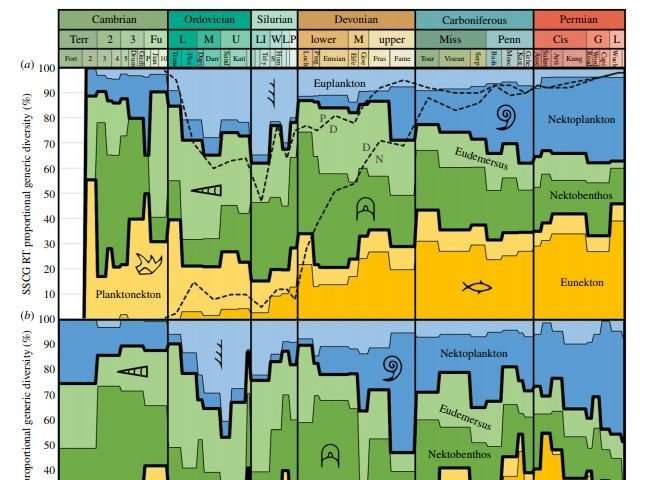July 18, 2018 report
New evidence suggests the Devonian Nekton Revolution never occurred

A pair of researchers at Yale University has found evidence that suggests the Devonian Nekton Revolution never actually occurred. In their paper published in Proceedings of the Royal Society B, Christopher Whalen and Derek Briggs describe their study and what they believe actually happened in the world's oceans during the Devonian Period.
Scientists who study the evolution of life during its early days have a difficult job—there is little evidence of the creatures that lived hundreds of millions of years ago. Then there is the problem of how to classify those that are found. Fossils of sea creatures from so long ago bear little resemblance to those that that are alive today, so how to arrange them is unclear. As just one example, some early sea creatures simply floated in the sea while others could clearly swim—but what if it is difficult to distinguish floaters from swimmers? Such difficulties underlie a debate surrounding the Devonian Nekton Revolution—an event theorized to have occurred between 419 and 359 million years ago. Some have suggested that during this period there was a sudden change in the population of creatures living in the sea from floaters to swimmers. So sudden was the change that it has been dubbed a revolution. But that may not have been the case at all—Whalen and Briggs claim that they have found evidence that supports a gradual movement to swimmers. That there was no revolution.
The study by the researchers entailed taking a close look at over 2000 fossils from 540 to 252 million years ago and classifying each as either a swimmer or a floater—they also classified them as living either on or near the ocean floor or higher up. The researchers found no evidence of a sudden shift from floaters to swimmers. Instead, they found evidence of a very gradual changeover that happened right up to the end of the Paleozoic.
Whalen and Briggs suggest that the reason they came to a different conclusion than earlier teams was because they classified fossils differently. As an example, they point out that they classified some ammonoids as swimmers and some as floaters, whereas prior teams had classified all of them as swimmers. They further argue that logic suggests a gradual shift to swimming. They point out that it is an activity that requires a lot of energy, which means a large intake of oxygen—but during the early parts of the Devonian, there was far less dissolved oxygen in the world's oceans.
More information: The Palaeozoic colonization of the water column and the rise of global nekton, Proceedings of the Royal Society B (2018). rspb.royalsocietypublishing.or … .1098/rspb.2018.0883
Abstract
The colonization of the water column is among the most important transformations in the evolution of animal life and global ecosystems. The Devonian nekton revolution has been identified as a major macroevolutionary event signifying the rapid occupation of the water column by independent radiations of swimming animals. Using new data, an expanded taxonomic coverage, sample standardization and increased ecological resolution, we analysed patterns of nektonization during the Palaeozoic. We find that nekton and eunekton were well established prior to the Devonian and did not diversify dramatically during any Palaeozoic interval. Relative nektic diversity and occurrences decreased rather than increased during the Devonian. Eunektic diversity and occurrences increased throughout the Palaeozoic, but this rise was protracted and cannot be attributed to any single interval. Our new data indicate that the metazoan colonization of the water column was considerably more complex and gradual than previously understood.
Journal information: Proceedings of the Royal Society B
© 2018 Phys.org




















